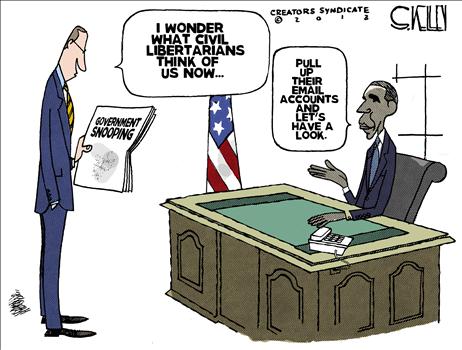
How did Edward Snowden get to be the world’s most famous whistle-blower? One key to that question is the radical libertarian Republican Ron Paul. His worldview is the culmination of a series of uniquely American traditions.
Günter Grass served in the SS, Alice Schwarzer is a tax evader and Daniel Cohn-Bendit was an advocate for pedophilia. Anyone who honors the lifetime achievements of these individuals can hardly avoid touching on those facts. No human being is perfect; unblemished heroes exist only in the imagination. But occasionally, what is perceived as a blemish turns out to be the key to understanding what makes an icon tick.
Not much was known about American whistle-blower Edward Snowden for a long time, but light is finally beginning to penetrate the fog.
Guardian editor Luke Harding wrote his biography (“The Snowden Files”), historian Sean Wilentz (far from being a conservative) published the results of his research into Snowden in the magazine New Republic and as early as December last year, Rolling Stone magazine released a lengthy double portrait of Snowden and Glenn Greenwald, the lawyer, blogger and writer for the Guardian who kicked off the whole NSA scandal. The picture that emerges isn’t yet completely clear. It’s still too early to make a final judgment. But much of what has been released is enlightening. Who was Edward Snowden before he gained notoriety as the man who copied millions of documents — many of them top secret — and shined a light on many practices of the National Security Agency?
The boy had a protected upbringing on the eastern coast of the United States, suffered through his parents’ divorce and dropped out of school in his sophomore year, after which he spent a lot of time on the computer surfing the Internet. In December 2001, he registered on the technology website Ars Technica, using the pseudonym “TheTrueHOOHA,” where for eight years he regularly posted articles dealing with God and the world, all the while gaining more and more Internet skills.
Politically, Snowden is most like a libertarian Republican. After an earlier visit to London, he expressed dismay at the large number of Muslims in the city, saying he was horrified. He bragged about his handgun — a Walther P22 — saying, “It’s my only gun but I love it to death.” He joined the Army during the Iraq War but was discharged just four months into his enlistment after he suffered two broken legs in an accident. In addition, Snowden was nearsighted and had unusually narrow feet.
Two years later, the fervent patriot was hired by U.S. intelligence, first by the CIA and later by the NSA. He was assigned to Switzerland, Japan and later Hawaii. During a lengthy automobile trip, he expressed the opinion that the United States should take more of a global leadership role. When The New York Times reported in January 2009 on a classified Israeli plan to attack Iranian nuclear facilities, Snowden flew into a rage against the newspaper as well as the individual who leaked the story, saying whoever leaked the information “should be shot in the balls.” He thought such things should stay classified so that Iran couldn’t find out what American plans were.
Patriotism, love of liberty, individualism, mistrust of the government — these impulses explain Snowden’s coldly calculated betrayal of NSA practices. These are all very American motivational impulses. It’s not surprising there are no Chinese, Russian, British or German Edward Snowdens.
Alice Schwarzer’s deeds are just as understandable, even in the absence of her tax fraud. In Snowden’s case, the images are blurred. Is he an arch-liberal or an arch-conservative? The point can be debated forever, but one thing is certain: Snowden is a typical American. Despite the many problems he has caused his nation, Americans have good reason to be proud of him.

Leave a Reply
You must be logged in to post a comment.